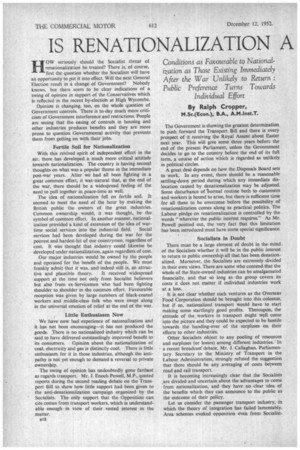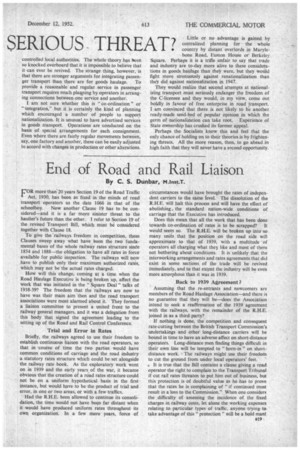IS RENATIONALIZATION SERIOUS THREAT?
Page 52

Page 53

If you've noticed an error in this article please click here to report it so we can fix it.
Conditions as Favourable to Nationalization as Those Existing Immediately After the War Unlikely to Return : Public Preference Turns Towards
Individual Effort
By Ralph Cropper, M.Sc.(Econ.), B.A. A.M.Inst.T. HOW seriously should the Socialist threat of renationalization be treated? There is, of course, first the question whether the Socialists will have an opportunity to put it into effect. Will the next General Election result in a change of Government? Nobody knows, but there seem to be clear indications of a swing of opinion in support of the Conservatives which is reflected in the recent by-electio'h at High Wycombe.
Opinion is changing, too, on the whole question of Government controls. There is to-day much more criticism of Government interference and restrictions. People are seeing that the easing of controls in housing and other industries produces benefits and they are more prone to question Governmental activity that prevents them from getting on with their jobs.
Fertile Soil for Nationalization
With this revived spirit of independent effort in the air, there has developed a much more critical attitude towards nationalization. The country is having second thoughts on what was a popular theme in the immediate post-war years. After we had all been fighting in a great common effort, it was natural that, at the end of the war, there should be a widespread feeling of the need to pull together in peace-time as well. .
The idea of nationalization fell on fertile soil. It seemed to meet the need of the hour by making the British public the owners of the great industries. Common ownership would, it was thought, be the symbol of common effort. In another manner, nationalization provided a kind of extension of the idea of war time social services into the industrial field. Social services had been developed during the war for the poorest and hardest-hit of our countrymen, regardless of cost. It was thought that industry could likewise be developed under nationalization, again regardless of cost.
Our major industries would be owned by the people and operated for the benefit of the people. We must frankly admit that it was, and-indeed still is, an attrac tive and plausible theory. It received widespread support at the time not only from Socialist believers but also from ex-Servicemen who had been fighting shoulder to shoulder in the common effort. Favourable reception was given by large numbers of black-coated workers and middle-class folk who were swept along in the universal emotion of relief at the end of the war.
Little Enthusiasm Now
We have now had experience of nationalization and it has not been encouraging—it has not produced the goods. There is no nationalized industry which can be said to have delivered outstandingly improved benefit to its consumers. Opinion about the nationalization of coal, electricity and gas is distinctly cool. There is little enthusiasm for it in those industries, although the antipathy is not yet enough to demand za reversal to private ownership.
The swing of opinion has undoubtedly gone farthest as regards transport. Mr. J. Enoch Powell, M.P., quoted reports during the second reading debate on the Transport Bill to show how little support had been given to the anti-denationalization campaign organized by the Socialists. The only support that the Opposition can cite comes from transport workers, which is understandable enough in view of their vested interest in the matter.
a I 8
The Government is showing the greatest determination to push forward the Transport Bill and there is every prospect of it receiving the Royal Assent about Easter next year. This will give some three years bat= the end of the present Parliament, unless the Government decides to go to the country before the end of its full term, a course of action which is regarded as unlikely. in political circles.
A great deal depends on how the Disposals Board sets to work. In any event, there should be a reasonable settling-down period during which any immediate dislocation caused by denationalization may be adjusted. Some disturbance of t ormal routine both to customers and workers is bound to arise, but there is sufficient time for all these to be overcome before the possibility of renationalization comes along as practical politics. The Labour pledge on renationalization is controlled by the words "wherever the public interest requires." As Mr. Powell pointed out, the very fact that this limitation has been introduced must have some special significance.
Socialists in Doubt
There must be a large element of doubt in the mind of the Socialists whether it will be in the public interest to return to public ownership all that has been denationalized. Moreover, the Socialists are extremely divided in their own views. There are some who contend that the whole of the State-owned industries can be amalgamated financially, and that so long as the group covers its costs it does not matter if individual industries work at a loss.
It is not clear whether such ventures as the Overseas Food Corporation should be brought into this colossus, but if so, nationalized transport would have to start making some startlingly good profits. Thereupon, the attitude of the workers in transport might well come into the picture and they could be expected to be hostile towards the handing-over of the surpluses on their efforts to other industries.
Other Socialists object to any pooling of resources and surpluses (or losses) among different industries. In a recent broadcast' debate, Mr. J. Callaghan, Parliamentary Secretary to the Ministry of Transport in the Labour Administration, strongly refuted the suggestion that there should be any averaging of costs between road and rail transport.
It is becoming increasingly clear that the Socialists are divided and uncertain about the advantages to come from nationalization, and they have no clear idea of the benefits which they can announce to the public as the outcome of their policy.
Let us consider the passenger transport industry, in which the theory of integration has failed lamentably. Area schemes evoked opposition even from Socialist controlled local authorities. The whole theory has heen so knocked overboard that it is impossible Jo believe that it can ever be revived. The strange thing, however, is that there are stronger arguments for integrating passenger transport than there are for goods haulage. To provide a reasonable and regular service in passenger transport requires much planning by operators in arranging connections between one service and another.
I am not sure whether this is " co-ordination " or "'integration," but it is certainly the kind of planning which encouraged a number of people to support nationalization. It is unusual to have advertised services in goods transport. Operations are conducted on the basis of special arrangements for each consignment. Even where there are fairly regular movements between, say, one factory and another, these can be easily adjusted to accord with changes in production or other alterations.
Little or no advantage is gained by centralized planning for the whole country by distant overlords in Marylebone Road, Euston House or Berkeley Square. Perhaps it is a trifle unfair to say that trade and industry are to-day more alive to these considerations in goods haulage than they were, but they woad fight more strenuously against renationalization than they did against nationalization in 1947.
They would realize that second attempts at nationalizing transport must seriously endanger the freedom of the C-licensee and they would, in my view, come out boldly in favour of free enterprise in road transport. I am convinced that there is not likely to be another ready-made seed-bed of popular opinion in which the germ of nationalization can take root. Experience of State Ownership has crushed its former appeal.
Perhaps the Socialists know this and feel that the only chance of holding on to their theories is by frightening threats. All the more reason, then, to go ahead in high faith that they will never have a second opportunity.




























































































